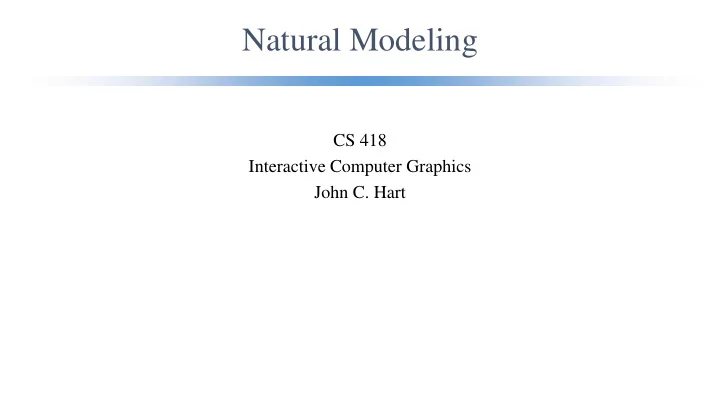

Natural Modeling CS 418 Interactive Computer Graphics John C. Hart
von Koch Snowflake Curve • Snowflake curve is made out of smaller copies of itself – 4 copies – Each 1/3 scale • Dimension of snowflake curve D = (log N )/(log 1/ s ) = log 4/log 3 ≅ 1.26 • Length = ∞ • Area = 0
Fractal Dimension • Self-similarity dimension s =1/2 s =1/3 s =1 • Make a D dimensional object out of N smaller copies scaled by s D =1 N =2 N =3 N =1
Fractal Dimension • Self-similarity dimension s =1/2 s =1/3 s =1 • Make a D dimensional object out of N smaller copies scaled by s D =1 N =2 N =3 N =1 D =2 N =1 N =4 N =9
Fractal Dimension • Self-similarity dimension s =1/2 s =1/3 s =1 • Make a D dimensional object out of N smaller copies scaled by s D =1 N =2 N =3 N =1 D =2 N =1 N =4 N =9 D =3 N =8 N =27 N =1
Fractal Dimension • Self-similarity dimension s =1/2 s =1/3 s =1 • Make a D dimensional D =0 object out of N smaller N =1 N =1 N =1 copies scaled by s D =1 N =2 N =3 N =1 D =2 N =1 N =4 N =9 D =3 N =8 N =27 N =1
Fractal Dimension • Self-similarity dimension s =1/2 s =1/3 s =1 • Make a D dimensional D =0 object out of N smaller N =1 N =1 N =1 copies scaled by s D =1 N =2 N =3 N =1 N = (1/ s ) D • Can solve for dimension D D =2 log N = D log 1/ s D = (log N )/(log 1/ s ) N =1 N =4 N =9 D =3 N =8 N =27 N =1
Terrain Modeling • In nature, amplitude inversely proportional to frequency • “Large things are farther apart” Nimbus, Ken Musgrave, 1987
Midpoint Subdivision • Fournier, Fussell & Carpenter • To make terrain, subdivide a horizontal mesh and perturb the new vertices vertically • Amount of perturbation should be proportional to length of subdivided edge • Random perturbations should be Gaussian (more likely zero than extreme) • Can lead to some creasing artifacts Carolina, Ken Musgrave, 1989
Mesh Subdivision • Triangle subdivision – three perturbed edge midpoints – four new triangles • Quad subdivision – four edge midpoints plus one face midpoint – four new quads • Cracking – Use same perturbation on neighboring elements to avoid cracks – Generate random displacement from hash function on midpoint location
Recommend
More recommend